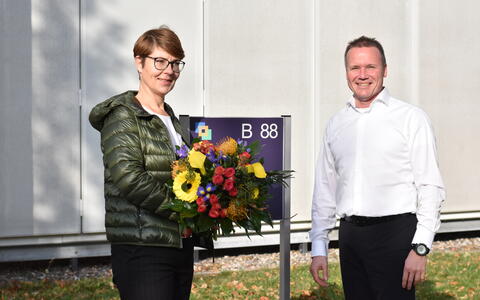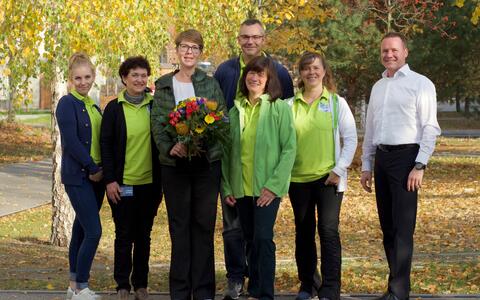Leveraging high-precision imaging for health research
“By making this commitment, people like Annett Anacker – our 5,000th participant – are contributing enormously to the advancement of health research in Germany,” says Professor Thoralf Niendorf, head of imaging at the GNC’s MRI center on the Berlin-Buch campus. “We will soon begin evaluating the data and establish standard values for renal and cardiac functions. These standard values will be of major significance for clinical practice.”
Prof. Thoralf Niendorf welcomes the 5000. participant Annette Anacker.
Annett Anacker from Berlin is one of 200,000 people aged between 20 and 69 who will be examined as part of the GNC health study and who will then be observed for up to 30 years. The anonymous data they provide will be analyzed to help identify the causes of widespread diseases such as cancer, diabetes, dementia, and cardiovascular diseases, thus improving the early diagnosis and prevention of these chronic illnesses.
The MDC’s location at the Berlin-Buch research campus is one of three GNC study centers in the German capital. By the time the study is over, 6,000 of the 30,000 participants from Berlin and the surrounding Brandenburg area will have come here to receive a 3 Tesla magnetic resonance imaging (MRI) scan. In an MRI scan. The high-precision images are generated by radio waves and a strong magnetic field, which means there is no exposure to harmful radiation. The full-body MRI scanner captures images of the head and brain, spinal cord, heart, chest, stomach, and pelvis in several layers, including images of the different organs and tissues. All five of the GNC’s MRI centers across Germany are using the same magnetic resonance scanners, thus ensuring the comparability of the images and data generated. The MRI data are a valuable addition to other health data collected by the GNC.
Participation in the study
Only those who receive an invitation letter from one of the 18 GNC study centers can take part in the study. A random sample of participants is generated from population registers. Participation in the study is voluntary. Examinations can only be carried out with the consent of the participant, who is also able to withdraw from the study at any time. In its first ten years, the study will receive €210 million in funding from the Federal Ministry of Education and Research (BMBF), participating German states, and the Helmholtz Association. The GNC was launched by the Helmholtz Association, participating universities, the Leibniz Association, and government research agencies.
Annett Anacker (3rd from left), 5000th proband in the NAKO health study in Berlin-Buch together with the NAKO team
Further information
Interview with Thoralf Niendorf and Annett Anacker
What makes us ill and what keeps us healthy?







